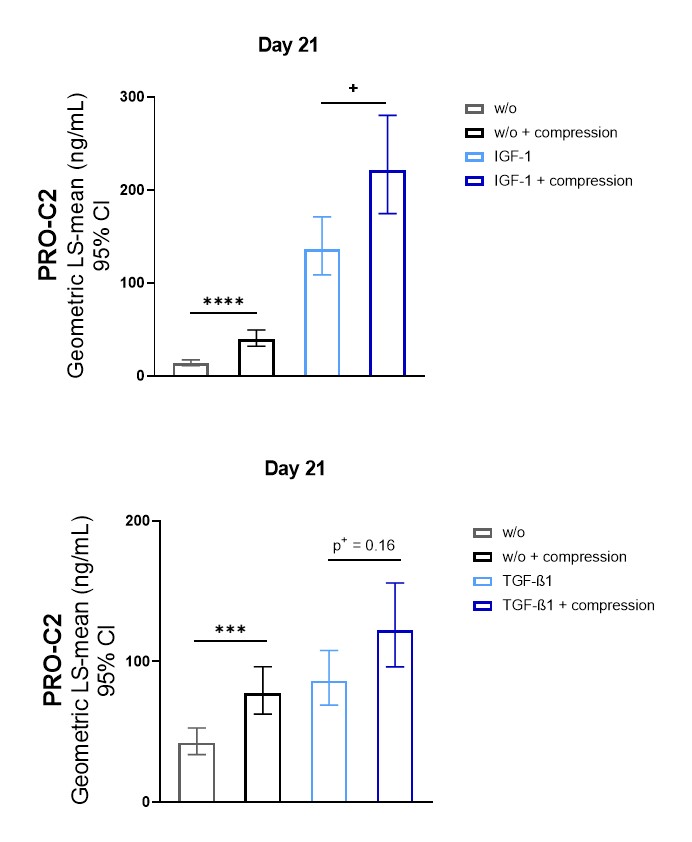Session Information
Date: Tuesday, November 9, 2021
Title: Osteoarthritis & Joint Biology – Basic Science Poster (1468–1479)
Session Type: Poster Session D
Session Time: 8:30AM-10:30AM
Background/Purpose: Mechanical loading of cartilage is an essential part of the function and maintenance of the joint. Despite the apparent importance of continuous mechanical loading, this factor is rarely considered in cell or tissue models potentially limiting their translatability. The majority of studies that have investigated the impact of mechanical loading on cartilage remodeling have done so in one sitting, investigating the effects of a single loading procedure, typically lasting hours or days of duration. Cartilage remodeling has however been described to be augmented when loading procedures are repeated over several days, allowing creep recovery of cartilage to occur between loading procedures. The aim of this study was to elaborate on such regimens of repeated loading and investigate cartilage remodeling when dynamic compression was repeated daily for three weeks.
Methods: Bovine cartilage explants were isolated from the femoral condyles of 1–2-year-old calves. Explants were subjected to 20 minutes of 1 MPa dynamic compressive loading five times a week, with culturing lasting 21 days. The impact of dynamic compression on cartilage remodeling was investigated in presence of growth factors IGF-1 and TGF-β1, as well as SB525334, a TGF-β receptor 1-selective kinase inhibitor. Cartilage remodeling was determined at baseline and once every week by measuring biomarkers for type II collagen formation (PRO-C2) and fibronectin turnover (FBN-C) in the conditioned media from explants. Metabolic activity was likewise determined at baseline and once every week by alamarBlue™.
Results: Daily cyclic loading of bovine cartilage explants increased PRO-C2 and FBN-C levels at day 21 compared to unloaded explants. Treatment with IGF-1 increased PRO-C2, but not FBN-C levels, compared to vehicle, while daily cyclic loading increased both PRO-C2 and FBN-C compared to IGF-1 alone. TGF-β1 increased both PRO-C2 and FBN-C levels compared to vehicle, while no additional effect of daily cyclic loading was observed in explants treated with TGF-β1. Inhibition of SMAD2/3 signaling by SB525334 blocked PRO-C2 and FBN-C release in both naïve and dynamically compressed explants indicating inhibition of both regular and compression induced cartilage formation.
Conclusion: We here show that daily low-grade cyclic compression of cartilage explants increases type II collagen formation. We find that the growth factor IGF-1 work in addition to the anabolic response generated by compression, increasing the overall impact on cartilage formation. Further, TGF-β1 signaling was found to be important for mediating the anabolic effect of mechanical loading in bovine cartilage explants. These data suggest that mechanical loading is important to consider in translational models.
 Figure 1. Effect of compression on IGF_1 and TGF-β1 induced cartilage formation.
Figure 1. Effect of compression on IGF_1 and TGF-β1 induced cartilage formation.
To cite this abstract in AMA style:
Gillesberg F, Engstrøm A, Karsdal M, Bay-Jensen A, Thudium C. Long Term Compressive Loading Modulates the Extracellular Matrix Response to Growth Factors in Bovine Cartilage Explants [abstract]. Arthritis Rheumatol. 2021; 73 (suppl 9). https://acrabstracts.org/abstract/long-term-compressive-loading-modulates-the-extracellular-matrix-response-to-growth-factors-in-bovine-cartilage-explants/. Accessed .« Back to ACR Convergence 2021
ACR Meeting Abstracts - https://acrabstracts.org/abstract/long-term-compressive-loading-modulates-the-extracellular-matrix-response-to-growth-factors-in-bovine-cartilage-explants/
